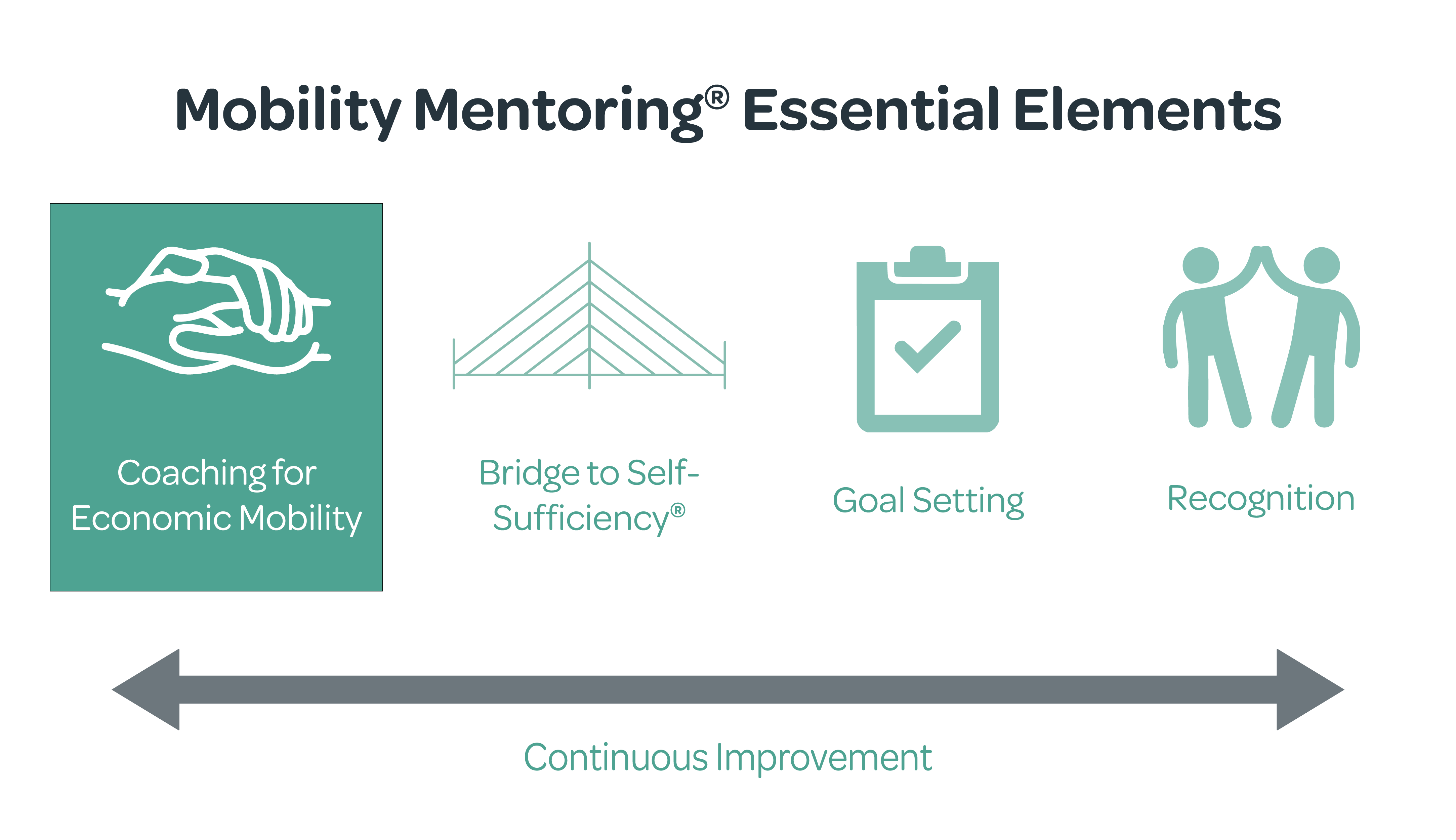Mobility Mentoring® Essentials Part One: Brain Science and Coaching
Sep 5, 2019
What is Mobility Mentoring? In this four-part blog series, we'll explain the basic elements of EMPath's coaching approach. Part one discusses the brain science of scarcity and why our model uses coaching.

Welcome to part one of the Mobility Mentoring Essentials blog series, a four-part series covering the essentials of EMPath's economic mobility coaching model. New blogs will be posted every week throughout the month of September.
Stress is a natural part of being human.
The day-to-day stresses of life can hijack anyone’s ability to control impulses and think clearly. Can you think of a time you snapped at a loved one after a long, frustrating day? Have you ever cheated on a diet (or a budget) when it’s been a tough week?
Stress affects human thinking and behavior in predictable ways. During a crisis, stress hormones flood the brain, self-regulatory skills are overpowered, and we enter “fight, flight, or freeze” mode. When this happens, it can become much harder to manage our thoughts, emotions, and behavior.
The body’s natural response to stress might not be damaging if stress occurs periodically. But if every day feels like a crisis, there can be lasting negative impacts.
What does stress have to do with poverty?
Poverty causes an incredible amount of stress. Lacking enough resources to provide for one’s family often means feeling unrelenting stress.
The need to juggle many priorities (finding affordable housing, caring for family, getting or staying healthy, managing debt and savings, completing school or job training), paired with social biases (classism, racism, social isolation), can take a devastating toll on families. What’s more, families in poverty have often been exposed to stress-inducing traumas like violence, homelessness, or persistent hunger.
In young children, chronic stress can impact brain development. And while a little bit of stress is good for children—for example, more challenging learning moments can cause good stress—too much stress, without regular or predictable alleviation, impacts the brain’s architecture and makes developing self-regulation in the future more difficult.
The impacts of chronic stress are far-reaching. While poverty presents challenges to people’s external lives – school achievements, physical and mental well-being, finances – its effects run even deeper. The chronic stress associated with poverty can cause physiological changes in the brain that profoundly alter the ways people react to the world around them. Poverty challenges people’s inner-selves – including one’s ability to self-regulate and plan for the future.
Does a person’s lack of self-regulation skills cause poverty?
No. It is critical to note cause and effect here. People do not become poor because they lack skills like self-regulation or a sense of self. Poverty is caused by complex economic and social systems, political decisions, and market forces, which need to be tackled on a systemic level by advocating for legislative change. Poverty itself causes challenges to these skills. Anyone would have similar challenges to their self-regulation skills when presented with the stresses of scarcity.
So chronic stress is bad and poverty is hard to overcome. What’s the solution?
The bad news is that poverty and stress compromise the very same skills and behavior most necessary for people to lift themselves out of it. However, the good news is that, like any skill or behavior, impulse control and goal-setting can be learned and improved upon. The path to economic independence requires individuals to juggle life’s many challenges with few resources and opportunities. In order for someone to make significant and lasting life changes, they must believe in themselves and their ability to make changes—which can be one of the hardest parts.
This brings us to the first essential element of Mobility Mentoring: coaching.
How does coaching help?
EMPath approaches coaching as a participant-directed one-on-one partnership. Coaches work with participants to strengthen their decision-making, persistence, and resilience over time.
Coaching staff (known as Mobility Mentors at EMPath) act as “human scaffolding” for building the skills and mindsets necessary for the complex task of moving out of poverty. The coach provides a structure for the participant to practice key self-regulation skills, such as comparing and weighing multiple priorities, goal-setting, and problem-solving. The coach also provides key messages to the participant about their belief in the participant’s ability to move forward, providing a platform for the building of positive identities, self-efficacy, and motivation.
Coaching is effective because it allows for repeated practice of self-regulation skills, repeated reinforcement of positive identities, and regular practice of self-determination. Through repetition, the participant gradually builds up the skills and mindsets in themselves and needs the coach’s support less. Just as the scaffolding is meant to be removed from a building once the work is done, the coach’s support is meant to be taken away over time.
This change doesn’t happen overnight. There is no quick fix to achieving economic independence. It takes time for habits to be unlearned and for new skills to develop and stick. And, because everyone is different, there is no “one size fits all” path to economic self-sufficiency. Each person’s journey is unique – and each person is the expert of their own journey.
Because the path to economic self-sufficiency cannot be found in any one health or human service category, EMPath’s coaching approach bridges multiple areas of life: family, finances, education, employment, and well-being. The recognition that all these silos are connected is another key element of EMPath’s coaching model, forming the foundation of Bridge to Self-Sufficiency® — the second essential element of Mobility Mentoring.